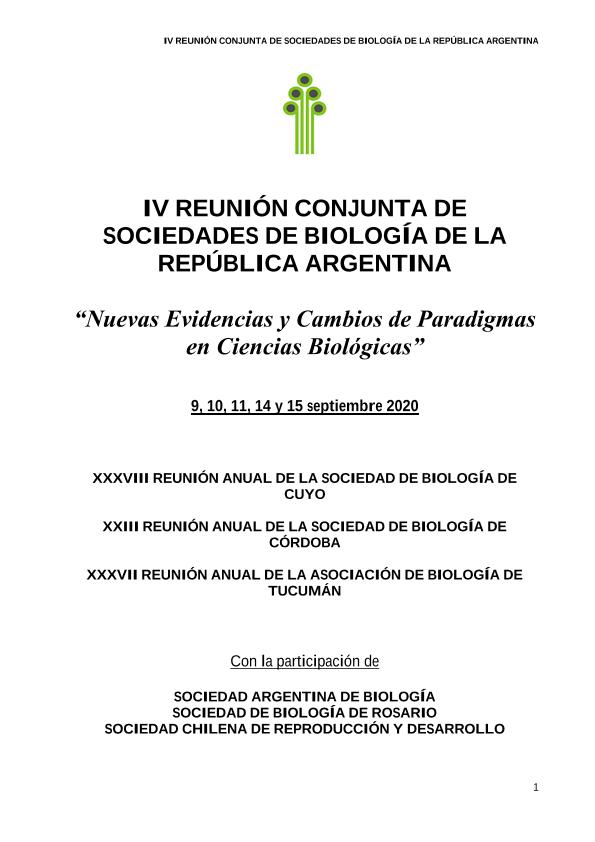Evento
Relación entre la disfunción tiroidea y el síndrome de ovario poliquístico en pacientes con alteraciones reproductivas
Tipo del evento:
Reunión
Nombre del evento:
IV Reunión Conjunta de las Sociedades de Biología de la República Argentina; XXXVIII Reunión Anual de la Sociedad De Biología De Cuyo; XXIII Reunión Anual de la Sociedad De Biología de Córdoba; XXXVII Reunión Anual de la Asociación de Biología de Tucumán
Fecha del evento:
09/09/2020
Institución Organizadora:
Sociedad de Biología de Cuyo;
Sociedad Argentina de Biología;
Sociedad de Biología de Córdoba;
Sociedad de Biología de Rosario;
Asociación de Biología de Tucumán;
Título de la revista:
Biocell
Editorial:
Tech Science Press
ISSN:
0327-9545
e-ISSN:
1667-5746
Idioma:
Español
Clasificación temática:
Resumen
Polycystic Ovary Syndrome (PCOS) is one of the most frequent endocrinopathies in women, and the leading cause of anovulatory infertility. Metabolic abnormalities such as type 2 diabetes, dyslipidemia, and obesity are frequently present in PCOS women. On the other hand, hypothyroidism is an endocrinopathy with a high prevalence in women, which impacts female reproduction and metabolism. Patients with PCOS present metabolic disturbances shared with hypothyroidism, including dyslipidemia and insulin resistance (IR). Current evidence indicates that in women with PCOS, the further development of hypothyroidism may aggravates IR and other risk factors, with adverse consequences on metabolism and fertility. In particular in our region, this condition may be exacerbated by the iodine deficiency which is associated with a higher prevalence of hypothyroidism. In view of the above, the aim of this study was to describe the relationship between PCOS and hypothyroidism in women with reproductive disorders, assessing metabolic and hormonal parameters. A retrospective study was carried out from a cohort of 74 women of 33.19 ± 4.7 years, who attended for infertility consultation at the Instituto de Medicina Reproductiva (IMR) in the Mendoza province. The following parameters were evaluated from the IMR's database: age, cause of infertility, PCOS (according to the Rotterdam consensus), TSH, free T4, HAM (antimüllerian hormone), glycemia, insulinemia, insulin resistance index (HOMA-IR) and body mass index (BMI). Statistical analysis was performed by means of SPSS-25 and GraphPad Prism 7 softwares. The analysis showed that hypothyroidism was present in 19.6% of infertile patients, in 22.4% of PCOS patients and in 4% of patients without PCOS. The linear regression showed that there is a significant correlation between HOMA-IR and BMI (p=0.003). Furthermore, HOMA-IR was significantly higher in patients who simultaneously had metabolic syndrome, IR and hypothyroidism (p=0.002). PCOS women presented HAM values above the reference value (p=0.0001). HAM levels assessed by means of multiple regression showed a significant correlation between this hormone and the PCOS patients, which were more pronounced in the hypothyroid patients (p=0.041). To conclude, we can infer that there is a correlation between thyroid hormones and PCOS that would have adverse metabolic and fertility consequences, and in particular in our region, it would be exacerbated by the nutritional iodine deficiency. The advance in the knowledge of the association between PCOS and thyroid dysfunction will lead to the development of better preventive, diagnostic, and treatment tools, needed to counteract the metabolic and fertility risks in a large percentage of women in our population.
Palabras clave:
THYROID
,
POLYCYSTIC OVARIAN SYNDROME
,
REPRODUCTION
,
HORMONE
Archivos asociados
Licencia
Identificadores
Colecciones
Eventos(IMBECU)
Eventos de INST. DE MEDICINA Y BIO. EXP. DE CUYO
Eventos de INST. DE MEDICINA Y BIO. EXP. DE CUYO
Citación
Relación entre la disfunción tiroidea y el síndrome de ovario poliquístico en pacientes con alteraciones reproductivas; IV Reunión Conjunta de las Sociedades de Biología de la República Argentina; XXXVIII Reunión Anual de la Sociedad De Biología De Cuyo; XXIII Reunión Anual de la Sociedad De Biología de Córdoba; XXXVII Reunión Anual de la Asociación de Biología de Tucumán; Mendoza; Argentina; 2020; 130-130
Compartir




